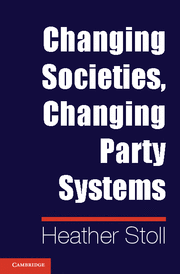Replication data sets for published works are available as tab-delimited text files (denoted [TXT]) and sometimes additionally as Microsoft Excel files (denoted [XLS]). Codebooks for these replication data sets are available either as PDF files (denoted [PDF]) or as text files.
Publications (Peer Reviewed)
Books:
Changing Societies, Changing Party Systems. 2013. Cambridge University Press.
 More from the
Cambridge Catalog
More from the
Cambridge Catalog The book's Amazon page
How do changes in society that increase the heterogeneity of the citizenry shape democratic party systems? This book seeks to answer this question. To do so, it focuses on the key mechanism by which social heterogeneity shapes the number of political parties: new social groups successfully forming new, sectarian parties. Why are some groups successful at this while others fail? Drawing upon cross-national statistical analyses and case studies of both Sephardi and Russian immigration to Israel and African American enfranchisement in the United States, the book demonstrates that social heterogeneity does matter. However, it makes the case that to understand when and how social heterogeneity matters, factors besides the electoral system---most importantly, the regime type; the strategies played by existing parties; and the size and politicization of new social groups---must be taken into account. It also demonstrates that sectarian parties play an important role in securing descriptive representation for new groups.
Replication Data:
Presidential Elections Analysis and Social Heterogeneity Measures for Presidential Democracies (Chapters 3 and 4) [XLS] [TXT] || Replication Data Codebook [PDF]
Articles and Book Chapters:
Social Diversity, Electoral Systems, and the Party System (with Rob Moser and Ethan Scheiner). 2018. Oxford Handbook of Electoral Systems.
Legislative Policy-Making Authority, Party System Size, and Party System Nationalization (with Allen Hicken). 2017. Electoral Studies 47: 113-124.
Presidential Coattails: A Closer Look. 2015. Party Politics 21 (3): 417--427. [PDF]
Are All Presidents Created Equal? Presidential Powers and the Shadow of Presidential Elections (with Allen Hicken). 2013. Comparative Political Studies 46 (3): 291--319. [LINK] [PDF] || Supplemental Materials [PDF] || Replication Data [XLS] || Replication Data Codebook [PDF]
Presidents and Parties: How Presidential Elections Shape Coordination in Legislative Elections (with Allen Hicken). 2011. Comparative Political Studies 44 (7): 854-883. [LINK] [PDF] || Supplemental Materials [PDF] || Replication Data [XLS] || Replication Data Codebook [PDF]
Dimensionality and the Number of Parties in Legislative Elections. 2011. Party Politics 17 (3): 405-430. [LINK] [PDF] || Supplemental Materials [PDF] || Replication Data [XLS] || Replication Data Codebook [PDF] || Errata [PDF]
Elite Level Conflict Salience and Dimensionality in Western Europe: Concepts and Empirical Findings. 2010. West European Politics 33 (3): 445-473. Reprinted in Zsolt Enyedi and Kevin Deegan-Krause, eds., 2010, The Structure of Political Competition in Western Europe, Routledge. [LINK] [PDF] || Supplemental Materials [PDF] || Replication Data [XLS] || Replication Data Codebook [PDF] || Errata [PDF]
What Moves Parties? The Role of Public Opinion and Global Economic Conditions in Western Europe (with James Adams and Andrea Haupt). 2009. Comparative Political Studies 42 (5): 611-639. [LINK] [PDF] || Supplemental Materials [PDF] || Replication Data [XLS] || Replication Data Codebook [PDF] || Errata [PDF]
Social Cleavages and the Number of Parties: How the Measures You Choose Affect the Answers You Get. 2008. Comparative Political Studies 41 (11): 1439-1465. [LINK] [PDF] || Supplemental Materials [PDF] || Replication Data [TXT] || Replication Data Codebook [TXT]
Electoral Rules and the Size of the Prize: How Political Institutions Shape Presidential Party Systems (with Allen Hicken). 2008. Journal of Politics 70 (4): 1109-1127. [LINK] [PDF] || Supplemental Materials [PDF] || Replication Data [TXT] [XLS] || Replication Data Codebook [PDF]
WhatIf: R Software for Evaluating Counterfactuals (with Gary King and Langche Zeng). 2006. Journal of Statistical Software 15 (4). [LINK] [PDF]
Work in Progress
A Number Most Convenient? The Representational Consequences of Legislative Size (with Geoff Allen). [PDF] || Supplemental Materials [PDF]
Social Diversity and Party System Size in Electoral Districts (with Rob Moser).
Book project: The Size of Democratic Assemblies.
Longer-term book project: Bureaucracy in Comparative Perspective.
Dissertation
Social Cleavages, Political Institutions, and Party Systems: Putting Preferences Back into the Fundamental Equation of Politics [PDF]
Miscellaneous
The WhatIf Website (with Gary King and Langche Zeng) [LINK]
Complete Israeli Election Results, 1949-2009 (with Nir Atmor). [XLS] Contribution to the Constituency Level Elections Archive (CLEA) at the University of Michigan, Ann Arbor. [LINK]